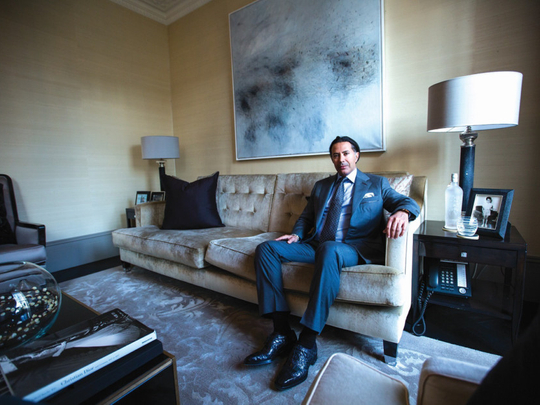
DUBAI
The first phase of United Iron & Steel’s (UIS) Abu Dhabi steel mill is due to open this spring as part of a Dh2 billion, 1.3 million square-foot project set to add 450,000 metric tonnes of galvanised and pre-painted steel coils to the emirate’s industrial output.
UIS, a joint venture between Dubai’s AJ Group and Saudi Air Distributions Company (SAFID) Group, is due to supply most of its output to SAFID, which specialises in providing heating, ventilation and air conditioning (HVAC) products to developers, in a move to secure its vertical supply.
SAFID is also expanding its Sharjah plant.
Saudi Arabian businessman Shaikh Mohammad Al Rahbani, whose family holds a controlling interesting in SAFID, said in an interview to Gulf News that the UAE’s business environment was a major factor in UIS’s decision to locate the factory in the Industrial City of Abu Dhabi (ICAD).
Speaking on the phone from his London home, Shaikh Mohammad said: “The infrastructure of the country is definitely appealing, and the business-friendly manner in the UAE in general is great for a businessman.”
He added: “I think we are going to be quite busy” in the GCC market. “We believe in the future there and the long-term future of growth.”
He highlighted a lack of red tape and laws and regulations amenable to business as key elements. Everything goes smoothly. I would compare it to European laws in many ways.
“From an investor point of view that’s very, very attractive. And then you take diversity in investment as well. Moving to the UAE, to Abu Dhabi, besides all the reasons I’ve mentioned, is to be [able to] diversify your manufacturing unit.”
The Abu Dhabi Economic Vision 2030 identifies metals — particularly steel, iron and aluminium — as a key area of manufacturing growth. The report, published in 2008, noted: “While the Emirate does not have sizeable ore reserves, Abu Dhabi has several natural advantages to make metal production a highly profitable growth prospect. Low energy costs, access to good industrial infrastructure at industrial cities, a world-class transport system and relatively affordable skilled labour will keep production costs extremely competitive.
“Moreover, the opportunity for manufacturing clusters to develop around primary metals production will ensure that the metals sector plays a leading role in Abu Dhabi’s economic diversification.”
Shaikh Mohammad said the first phase of UIS’s expansion was due open by May 2017. “I think there will be enough business in the GCC area to keep us busy for the time being and for the future to come.”
One of the key areas of business is related to development for Dubai Expo 2020. Shaikh Mohammad said: “SAFID has had a presence in the UAE for 25 years. Recently we have bought more plants in Sharjah, and we are expanding the factory to four times the size of the previous one. The reason is Expo 2020. We are engaged in a number of these buildings.”
The collapse in oil prices is not a major factor in his investment decisions.
“The oil price went down severely, but if you go back in time the oil was, for three or four consecutive years, over $100. So the GCC has built a good cushion of reserves. However, the belt is tightening in the GCC countries and the fiscal discipline is taking place right now.
“Personally, I do not see any concern in the near future because there are some strategic projects that have to continue in the UAE and in Saudi Arabia, which is the big market of the GCC.”
He praised the recent efforts of the Saudi Arabian government to promote diversification through the Saudi Vision.
“As a Saudi investor I think the movement is quite positive. It’s going to take some time.” But he said the Saudi Arabian market was still different to that of the UAE, with different needs. And while changes in Saudi Arabia’s regional powerhouse economy would affect those of other GCC countries, “it’s all going to be a positive effect.”
“As I said, there is a huge cushion of funds, and I think Saudi Arabia will always play positive role in the GCC. Saudi is moving now to modernise all the laws they have for investment and for diversity, et cetera et cetera, which is really positive.”












